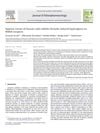 30 citations,
February 2003 in “Annals of Neurology”
30 citations,
February 2003 in “Annals of Neurology” Progesterone and related compounds may help control seizures linked to the menstrual cycle but have limitations that need addressing.
 2 citations,
February 2003 in “Annals of Neurology”
2 citations,
February 2003 in “Annals of Neurology” Neuroimaging suggests that treatments targeting brain steroids could help control epilepsy, especially types linked to the menstrual cycle.

Early NAS level changes affect alcohol consumption vulnerability.
 7 citations,
October 2017 in “Behavioural Pharmacology”
7 citations,
October 2017 in “Behavioural Pharmacology” Fluoxetine's effectiveness as an antidepressant in mice depends on a specific protein activity and a 5-minute pretest.
 October 2010 in “Epilepsy Currents”
October 2010 in “Epilepsy Currents” Ketogenic diet, neurosteroids, and HMGB1-TLR4 signaling pathway are potential targets for new epilepsy treatments.
 40 citations,
December 2012 in “Epilepsia”
40 citations,
December 2012 in “Epilepsia” Neurosteroids change how GABA_A receptors work in the brain, which could be important for treating temporal lobe epilepsy.
 3 citations,
September 2020 in “Molecular Brain”
3 citations,
September 2020 in “Molecular Brain” The anti-viral drug Elvitegravir may protect brain cells from damage related to neurodegenerative diseases.
 September 2021 in “Journal of skin and stem cell”
September 2021 in “Journal of skin and stem cell” Lactium, a milk protein, can help reduce symptoms of skin disorders linked to stress and anxiety without side effects.
8 citations,
October 2019 in “The Journal of surgical research/Journal of surgical research” Sodium valproate helps skin healing by affecting GABA and histone deacetylase.
12 citations,
February 2017 in “Journal of neuroscience research” Removing certain brain receptors in mice worsens seizure severity and response to treatment during hormone withdrawal.
20 citations,
January 2017 in “Epilepsia” Blocking neurosteroid production can lead to more seizures and faster epilepsy onset in rats.
4 citations,
April 2017 in “F1000Research” Mitochondrial problems in diabetic nerve damage might cause pain by lowering the production of certain nerve-related steroids.
30 citations,
November 2019 in “Genetics selection evolution” Chinese domestic goats have unique genetic traits due to domestication and geographic isolation.
 10 citations,
September 2014 in “The Journal of Steroid Biochemistry and Molecular Biology”
10 citations,
September 2014 in “The Journal of Steroid Biochemistry and Molecular Biology” Allopregnanolone increases KCC2 expression in baby male rats' brains, while finasteride doesn't affect it.
 27 citations,
July 2008 in “Neuroscience”
27 citations,
July 2008 in “Neuroscience” Finasteride given to baby rats causes anxiety-like behavior and worsens learning from punishment in adult rats.
 17 citations,
February 2009 in “Journal of Ethnopharmacology”
17 citations,
February 2009 in “Journal of Ethnopharmacology” Asiasari radix extract may relieve certain types of pain by affecting GABA and NMDA receptors.
 2 citations,
July 2020 in “Behavioural Brain Research”
2 citations,
July 2020 in “Behavioural Brain Research” Changing neuroactive steroids in baby male rats affects their memory and learning differently as they grow up.
 34 citations,
April 2014 in “Psychopharmacology”
34 citations,
April 2014 in “Psychopharmacology” Stress and alcohol affect brain chemicals differently in rats, mice, and humans, influenced by genetic differences.
 3 citations,
October 2015 in “Human Psychopharmacology-clinical and Experimental”
3 citations,
October 2015 in “Human Psychopharmacology-clinical and Experimental” Finasteride doesn't affect sleep spindles in men.
 134 citations,
June 2005 in “Neuropsychopharmacology”
134 citations,
June 2005 in “Neuropsychopharmacology” GABRA2 gene variations impact alcohol response, and hair loss medication finasteride reduces some effects.
 54 citations,
August 2005 in “Alcohol”
54 citations,
August 2005 in “Alcohol” Finasteride affects alcohol intake in male mice, possibly due to neurosteroids.
 26 citations,
July 1995 in “Neurobiology of Aging”
26 citations,
July 1995 in “Neurobiology of Aging” Finasteride affects prostate weights and pituitary activity differently with age.
 17 citations,
February 2014 in “The International Journal of Neuropsychopharmacology”
17 citations,
February 2014 in “The International Journal of Neuropsychopharmacology”  6 citations,
February 2019 in “Scientific reports”
6 citations,
February 2019 in “Scientific reports” A brain-produced steroid causes increased scratching in mice with a skin condition similar to eczema.
 3 citations,
August 2016 in “Behavioural Brain Research”
3 citations,
August 2016 in “Behavioural Brain Research” Finasteride given to baby rats reduces dopamine release and increases alcohol consumption in adult males.
 137 citations,
March 2006 in “Cns Drug Reviews”
137 citations,
March 2006 in “Cns Drug Reviews” Finasteride treats enlarged prostate and hair loss, but may cause side effects in some patients.
 65 citations,
January 2011 in “Frontiers in Endocrinology”
65 citations,
January 2011 in “Frontiers in Endocrinology” Neurosteroids show promise for treating epilepsy and more research is needed.
 61 citations,
April 2014 in “The Journal of Steroid Biochemistry and Molecular Biology”
61 citations,
April 2014 in “The Journal of Steroid Biochemistry and Molecular Biology” Finasteride affects brain and blood steroids, causing lasting sexual and emotional side effects.
 38 citations,
April 2018 in “Psychopharmacology/Psychopharmacologia”
38 citations,
April 2018 in “Psychopharmacology/Psychopharmacologia” Blocking CRF-R1 can reduce alcohol intake in stressed mice.
 34 citations,
May 2007 in “Neuroscience”
34 citations,
May 2007 in “Neuroscience” Finasteride reduces alcohol withdrawal severity in male mice but increases it in female mice.

























